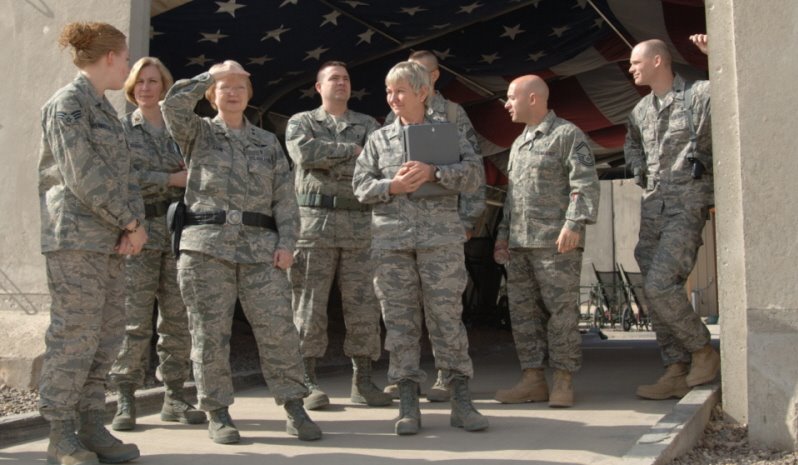The authorities in the recent times have been claiming that the MNS is an auxiliary force part of the armed forces, disregarding the legal status of the MNS as a corps of the regular Army. The Indian Military Nursing Service Ordinance, 1943 do not apply to the women officers serving in the MNS. The Ordinance applied only to the IMNS which ceased to exist in the Army 65 years back; however the Ordinance continues to be in force until repealed. The Government of India through Army Instruction 274/50 set the terms and conditions of service for regular commissions for officers in the MNS, and made all existing members of the IMNS part of the then newly formed MNS. The Indian Army Act, 1911 to which the IMNS was subjected by virtue of the Ordinance, stood repealed on the commencement of the Army Act, 1950 (22nd July 1950). The MNS is under the Army Act, 1950 and the rules made thereunder from the commencement of the Act. The women officers serving in the MNS are officers of the regular Army. However the name of the auxiliary force which was constituted by the Ordinance (though not existing today) continues to be IMNS. It is an irrefutable fact that the IMNS and MNS are two different legal entities.
Earlier the Honourable Supreme Court of India was also misled in the case of Jasbir Kaur & Others Vs Union of India & Others [Uniform Case - transfer case (civil) 38 of 2002 order dated 13/11/2003]; and the Court observed that the Indian Military Nursing Service Ordinance, 1943 is still in force and the members of the IMNS are governed by it (true statement). But the Court was misled to believe that the IMNS and the MNS are the same. Unfortunately, the existence of the Indian Military Nursing Service Ordinance, 1943 in the statute books is being used by the authorities to misled Courts in the adjudication of disputes regarding the terms and conditions of service of the women officers in the MNS.
Earlier the Honourable Supreme Court of India was also misled in the case of Jasbir Kaur & Others Vs Union of India & Others [Uniform Case - transfer case (civil) 38 of 2002 order dated 13/11/2003]; and the Court observed that the Indian Military Nursing Service Ordinance, 1943 is still in force and the members of the IMNS are governed by it (true statement). But the Court was misled to believe that the IMNS and the MNS are the same. Unfortunately, the existence of the Indian Military Nursing Service Ordinance, 1943 in the statute books is being used by the authorities to misled Courts in the adjudication of disputes regarding the terms and conditions of service of the women officers in the MNS.
The vested interests are trying to take advantage of the Government’s initiative to repeal the obsolete laws, ‘to recreate an auxiliary force like the IMNS which existed 65 years back’. They have partly won by suppression of facts from the Law Commission of India; and made them to recommend ‘a change in the existing law pertaining to IMNS’ on the repeal of the Indian Military Nursing Service Ordinance, 1943. Accordingly, the case for deletion/amendment to the Paras of the Regulations for the Army, 1987 (Para 32, 58, 65, 66, 67, 75, 76, 77, 81, 105, 109, 255, 341, 618, 619, 621, 733 and 1394) where the women officers in the MNS finds mention as officers of the regular Army is under process. They are also hotly pursuing a case for the amendment of Rule 16A of the Army Rules, 1954. The other cases which are in process, are cancellation of Army Orders 353/73, 11/82 etc; and also making separate Regulations for the MNS, after detaching it from the regular Army. They have almost completed rewriting the entire military law governing the MNS, and ready to reconstitute it as an auxiliary force like the erstwhile IMNS.
Some of the committees they have set in the past are Lt Gen MG Girish Committee, Maj Gen MKV Panicker Committee, and Brig JS Yadav Committee etc. Another such Committee set up to re-designate the ranks of the women officers in the MNS to sister, matron etc. and remove their army officer insignias and segregating their family accommodations from the officers pool etc. is trying to obtain the consent of some senior functionary in the MNS. All these Committees, set up with the devious aim to make the MNS an auxiliary force, is in no way representing the aspirations of the 4000 plus women officers serving in the MNS. But their personal vendettas will only serve the enemy nations, by directly undermining the operational preparedness of our armed forces.
If the Army exists for war, then casualties are bound to happen. Therefore no Army in the world can exist without an effective mechanism to manage the mass causalities; the Indian Army cannot be an exception. If the Government wants to maintain the excellent standards of nursing care provided by the MNS, then it has to step in now; to save the MNS from virtual destruction in the hands of the vested interests. Otherwise the reconstitution of the MNS as an auxiliary force in the garb of IMNS will soon be a reality.
If the Army exists for war, then casualties are bound to happen. Therefore no Army in the world can exist without an effective mechanism to manage the mass causalities; the Indian Army cannot be an exception. If the Government wants to maintain the excellent standards of nursing care provided by the MNS, then it has to step in now; to save the MNS from virtual destruction in the hands of the vested interests. Otherwise the reconstitution of the MNS as an auxiliary force in the garb of IMNS will soon be a reality.

